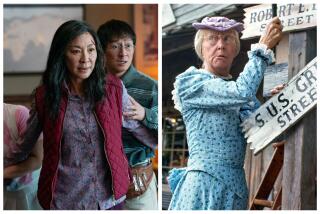Parents’ age is only a number
- Share via
I understand but don’t agree with “ ‘Too Young to Have a Mother That Old’ ” [Dec. 10]. Similar to the author (and I thought I was the only one from my generation with parents that old), my parents were almost 43 and 45 when I was born in 1958.
I was only 21 when my mother died at 64, and 33 when my father died at the reasonable age of 79.
I don’t remember anyone ever asking if I was their grandchild. Maybe everyone in Brooklyn looked like a grandparent back then. I knew they were older parents, and it occasionally seemed odd, because my mother would never reveal her age. But I wasn’t really focused on their ages.
I was 28 and 35 when I had my two children; my husband was 36 and 43. I don’t think our children consider us old or young; we’re just their parents.
With the average life expectancy being around 80, I don’t think it is irresponsible to have and enjoy children until they are 40 and you are 80 or 82. My main goal would be to make sure I’m around until they are able to take care of themselves, and I hope that would be achieved by age 40.
I hope to see my children to that age and beyond in good health, but anything could happen to anyone. We can’t make the perfect plan according to age.
Donna Foster
Ventura
--
I am the daughter of a father who was 40 when I was born in 1963 and am happy to report that he is doing well at 84. How blessed I am to have him in my adult life.
My mother, however, passed away at 40 from breast cancer when I was only 3. It wouldn’t have mattered to me how old she was when I was conceived, or if her stamina wasn’t that great, if only I was granted more years with her. Life is a gift.
Monica Mitchell
Torrance
--
A few years ago, when I noticed the growing trend of later parenting, I wondered what this might mean to the children of older parents. I interviewed some now adult children and many felt much as did Meredith Resnick. (My research resulted in the book “Last Chance Children: Growing Up With Older Parents.”)
Although parents may feel better equipped to rear children and are more settled financially in their late 30s and 40s, the children, as Resnick experienced, may have to deal with aged and infirm parents earlier in their lives than do children born to younger parents.
Having parents mistaken for grandparents was an embarrassment for many in my study, but other issues, such as lack of energy, are more important. My research yielded some good advice about ways to mitigate some of these drawbacks.
Important to the children in my study was the time their parents spent with them. “Quality time” was nice, but they appreciated quantities of time devoted to the children’s needs and interests. “Even though my Dad couldn’t play soccer with me, he came to all my games,” said one young man with a childhood he regarded as happy.
Another suggested that with two career parents, or parents who lack energy, it is important to have surrogate parents or grandparents to serve as supports for the child.
A woman who had fears about her parents’ death when she was very young (“I used to creep up to their bedroom door at night and listen to make sure they were breathing”) felt it was important to address the late-born child’s concerns about death openly and positively to relieve or dispel those fears.
Overall, however, parental time seemed to be the most important factor contributing to a child’s feeling of well-being -- and this could apply to children with parents of any age.
Monica B. Morris
Los Angeles


